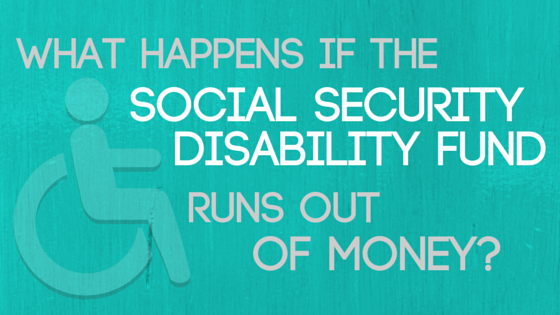What Happens If The Social Security Disability Fund Runs Out Of Money?

When you say the words “disability insurance,” most people immediately think of Social Security. It’s what comes up in most online searches, and most people believe Social Security disability benefits will offer them sufficient coverage for their basic expenses. This isn’t true, and according to a recent article by the Associated Press, the Social Security disability fund is expected to run dry by late 2016. So what does this mean for you?
There might be an automatic cut in benefits.
If the disability trust fund runs out of money, it would trigger an automatic 19% cut in benefits, unless Congress takes action. According to the AP, the average monthly benefit for disabled workers and their families is $1,017, though this number fluctuates slightly in other reports. The average beneficiary would see a reduction of $193 per month, which can be a significant blow to many who rely on these benefits.
It’s time to change how we view Social Security.
This isn’t the first time the Social Security has been in the news for warning all of us of potential shortfalls. However, even if continued concerns over the fund’s solvency prove to be pointless, the conversation should open our eyes to one important fact: Social Security disability payments are often not enough to live on as a primary source of income. This Social Security Administration factsheet points out that the average monthly disability benefit is barely enough to keep a beneficiary above the 2014 poverty level.
That’s why, for those who aren’t yet disabled, it’s a good time to consider what private disability insurance may provide before SSDI falls short. Half of working Americans couldn’t make it a month without their income before financial difficulties would kick in. This is a serious problem that could be remedied with individual disability insurance, yet more than half of working Americans don’t have it.
You should especially consider individual disability insurance if:
- You’re a wage earner and responsible for your own living expenses
- You’re a wage earner and responsible for the living expenses of your dependents
- You’re an employee who receives little or no disability benefits through your employer
- You’re self-employed
People often think that the size of your salary determines whether or not you need disability insurance. However, you should be protecting your income whether you’re a file clerk, a doctor, a truck driver or a professional football player.
It doesn’t matter if you’re single, married, have dependents or are responsible of yourself. If you don’t have sufficient savings to replace your income after a disabling illness or injury, you should have private disability insurance.
Tips for determining your coverage
Look at your expenses.
- How much you spend each month on everything from necessities to creature comforts should give you a baseline of how much you need your disability policy to cover
- How much does it cost to maintain your lifestyle every month?
Review your current long term disability coverage to see if it will meet your income needs.
- You may find that your employer-sponsored long-term disability coverage only covers 60% of your base salary, and you need to cover at least 80% of your salary to maintain your family’s lifestyle
- In that case, consider supplementing this coverage with individual disability insurance to bridge the gap
If you’re without disability insurance and are shopping for a policy, start by researching coverage and rates online.
- Before you buy, it’s a good idea to sit down with a trusted insurance agent or financial adviser who specializes in individual disability insurance to discuss your options
- Changing the length of a long-term disability waiting period before your benefits kick in also can help reduce costs
- For some, it may make sense to end coverage after just five or 10 years, while others may feel that it’s worth the extra cost to have lifetime coverage
Do you have questions about your disability insurance policy, or need help while shopping around for one? DarrasLaw offers free consultations on disability insurance matters, including free policy analysis.
More Resources
Disability Insurance 101: Tips To Get You On The Right Track


